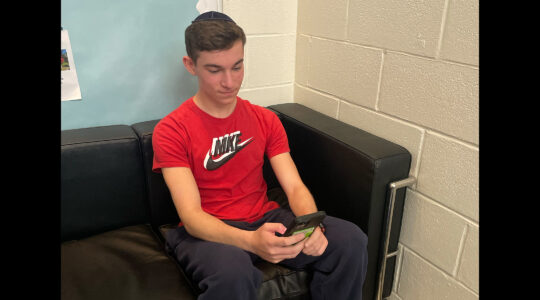In her new show, “Monajat,” Galeet Dardashti has taken the 13th-century Sufi poem of the same name and blended it into the traditional Persian songs and liturgy for Selichot. ()
NEW YORK (JTA) — Growing up, Galeet Dardashti toured and performed with her father, Farid, a renowned cantor, performing Middle Eastern and Persian music throughout the United States and Canada as part of The Dardashti Family.
“We’ve been called the ‘Jewish Von Trapps,’ ” Dardashti says jokingly.
Dardashti, a mother of two in her mid-30s, now is carrying the musical mantle of her family, which stretches back several generations in Iran, on her own. The lead singer of Divahn, an all-female Middle Eastern ensemble, has a new solo show, "Monajat," premiering Sept. 2 in Miami that will tour several U.S. cities throughout September until the start of Rosh HaShanah.
In "Monajat," Dardashti has taken the 13th-century Sufi poem of the same name, which means “fervent prayer,” and blended it into the traditional Persian songs and liturgy for Selichot, the penitential prayers recited by Jews in the days leading up to the High Holidays.
“My idea with this show,” Dardashti explains, “was reinventing a ritual” — a task made more difficult by the fact that Selichot isn’t even on the radar of most North American Jews.
The show is the first commission of the New Jewish Culture Network, a partnership between the Foundation for Jewish Culture and performing arts presenters across the United States. It features Dardashti performing some of the Persian piyyutim, or liturgical poems, traditionally chanted by men as part of the Selichot service, as well as other liturgical and secular Hebrew and Persian poetry set to new music.
Dardashti first learned of "Monajat" while listening to recordings of her grandfather, Yona, a famous singer of Persian classical music as well as a cantor. At the end of his recitation of Selichot, he would freestyle to the poem in a manner consistent with other Persian classical singers.
“You choose poets you like and then you basically improvise to their poems,” Dardashti says, explaining her grandfather’s method. “It’s a cool thing he found this poem so thematically related to Selichot.”
But more than serving as the inspiration for "Monajat," Yona, who had a weekly television program in his native Iran, will accompany his granddaughter during the performance — she plans to sing along with her grandfather’s recorded voice. "Monajat" also will feature video from artist Dmitry Kmelnitsky, who will incorporate images during the performances. Dardashti hopes that the added feature will make “people feel part of the ritual instead of being [merely] audience members.”
Given Dardashti’s lineage, it may seem like her musical path was preordained. Yet it came as a surprise, if not to everyone else then at least to her.
“I didn’t think my music would take a major part of my career,” says the singer, who in 2009 earned a doctorate in anthropology with a focus on Middle Eastern and Arab musical performance in Israel.
She thought that her academic pursuits would occupy a more central position in her life. But, she recalls, in “Austin, Texas, as a graduate student, I started to do some music on the side. The music just took off in a way that I would not have expected.”
Dardashti began to receive recognition for her first album, “The Naming.” The project, which she produced with the support of the Six Points Fellowship, brought together stories about female characters from the Torah, midrash and other sources to create a collage of Jewish texts, which gave voice to the marginalized women in the Bible such as Michal, the daughter of Saul and wife to David, who never bore any children, or Vashti, the wife of Achashverosh, who often is vilified in rabbinic literature.
While "Monajat" has no explicitly feminist message like "The Naming," Dardashti does recognize that being a woman reciting Persian liturgical poetry is statement enough, especially in a community that does not have female cantors.
“I’m doing this sacred music from the Persian tradition basically as a chazan [cantor], so I don’t think I need to do anything more,” she says.
Yet Dardashti has never encountered any resistance in her immediate family. Her father, recently retired, was a Conservative cantor at an Ashkenazi synagogue who encouraged his daughters to pursue their passions.
“I was never told this was a male realm,” she says.
For Dardashti, her new show is about helping people rediscover a powerful tradition. "I’m hoping," she says, "that people will come away from the performance with a new appreciation for the ritual of Selichot."
JTA has documented Jewish history in real-time for over a century. Keep our journalism strong by joining us in supporting independent, award-winning reporting.





